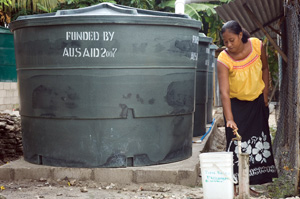Many people in developing countries depend on the natural environment for their income, food and water, making them vulnerable to climate change impacts such as increases in severity in droughts, floods and other climate-related natural disasters. This has the potential to undermine and even reverse hard-won development progress.
On World Environment Day, Australians can be proud that they have contributed to achieving one of the world's Millennium Development Goals – halving the number of people without sustainable access to safe drinking water – well in advance of the 2015 deadline. But there is still much more we can do. Rio +20, the United Nations Conference on Sustainable Development taking place in Brazil later this month, will be a key opportunity for ensuring global commitment to sustainable development through sustainable solutions to mitigating poverty and inequality.
Australia is already working with developing countries to support the sustainable management of resources. This work is critical in order to reduce poverty and ensure long-term development gains.
Protecting fresh water supplies in Kiribati
In Kiribati, population pressures, pollution and salt water intrusion, are putting water supplies at risk. Australia is working with the World Bank to protect Kiribati's freshwater supplies as part of our Climate Change Adaptation Program. The program aims to protect water supplies from pollution, reduce dysentery and diarrhoea cases to less than 8,000 by 2016 and reduce infant mortality from diarrhoea by 50 per cent by 2015.
Australia's support has already led to positive changes in Kiribati's environmental policy and has seen the construction of seawalls to protect public infrastructure as well as mangrove planting to reduce erosion.
Protecting coastal eco-systems in Vietnam
Vietnam's coastline – home to nearly 40 million people – is under threat from deforestation, erosion, flooding and a fast-growing population. Water and soil quality is diminishing and ground level water levels are falling.
In partnership with Germany, Australia is helping Vietnam manage and protect its coastal ecosystems and respond to the impacts of climate change. The five-year Climate Change and Coastal Ecosystems Program is working with local communities in five provinces to develop climate change adaptation plans that include rehabilitating mangroves, improving dyke construction, and supporting communities to adopt alternative farming practices and identify new and sustainable income opportunities. The Program also supports climate change adaptation on a national level, with lessons learned being used to develop effective policies.
Improving water supplies in the Caribbean
The Caribbean Islands are becoming increasingly short of water. Predicted rises in temperature and sea levels and decreasing rainfall will put further pressure on limited fresh water stocks. Australia is working with a range of partners to introduce new ways of improving water supply in Bequia, the largest of the Grenadine islands.
Through the pilot project, a solar powered system has been installed to remove salt from water. The system is delivering water that exceeds previous standards – both in cost and quality – while feeding excess solar energy into the national grid. The initiative demonstrates how renewable technologies can support climate change adaptation by making communities more resilient to water shortages in sustainable ways.

